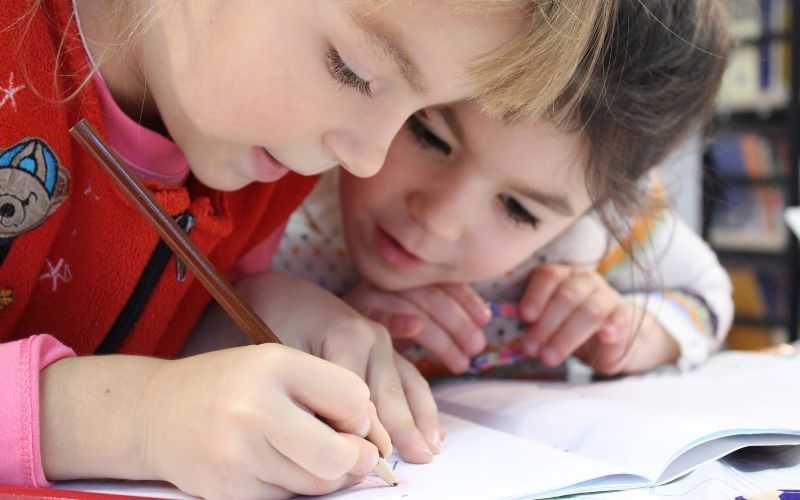How to Help Your Preschool Child Develop Pre-Writing Skills


What skills go into prewriting? How can you help your child to develop pre-writing skills? More importantly, how do you ensure that they build a strong learning foundation?
Pre-writing skills consist of all of the “primary skills” needed before a child starts learning how to write. Your child’s preschool years are very important, as it’s during this time that they start building all the skills they need to succeed in an academic setting. These skills include everything from physical writing skills, including posture and motor skills, to cognitive development, including the ability to think critically and creatively. Let’s dive right into how important these skills are and how you can set your child up for success with some pre-writing activities!

Physical Pre-writing Skills Development
Posture
Posture is something that is often overlooked, but it can have a huge impact on how young children behave in relation to writing.
Without correct postural control, your child may develop poor habits in early childhood, which they may carry through as they progress – things such as leaning backwards or forwards, fidgeting in their seat, sliding, and swinging in their chair are not only dangerous, but can also influence their level of concentration, and their ability to effectively retain and relay information!
There are lots of ways in which you can help your child to develop good posture – most of which combine elements of balance and muscular control. These activities include:
- Dancing 💃
- Playing a sport ⚽️
- Painting on an easel 🎨
- Playing with playdough
Fine Motor Skills Development and Handwriting Training
Fine motor skills link to more specific, small movements, such as holding a pen or typing. As these skills, including pencil grip, require the use of our smaller hand muscles and bones, they don’t come as naturally as other actions do (for example, walking). As a result, this calls for a little more practice and focus on smaller movements in the prewriting stage, to ensure that children feel prepared when they finally embark on their writing journey and start developing handwriting skills. ✏️
In order to develop fine motor skills, it is recommended that children engage in practical, fine motor activities. Some of these are:
- Playing with construction-type toys, such as Lego and building blocks 🎳
- Activities that integrate a keyboard (this can be a computer, a piano, a toy…) 🎹
- Arts and crafts including finger painting, drawing with crayons, using paintbrushes, cutting (please ensure that all materials are safe for a child to use), origami, weaving, …🖍
- Cooking 👨🍳
Letter Formation
Being able to effectively copy and remember the shape of each letter is extremely important for reading and writing comprehension. In the prewriting stage, a great way to encourage your child to work on letter formation is by focusing on specific shapes, which are in some ways present in most alphabetical characters – these are vertical lines, horizontal lines and diagonal lines, squares and circles. This will have a really positive impact on their ability to write letters in the future.
Additionally, the prewriting stage is a great time for your child to develop their copying skills, which will be very useful when they start learning how to write 📝
Encourage your child to work on copying skills before moving forward with letter formation – this will ensure that your child is on the right path to successfully being able to form letters when they start writing!
Some pre-writing activities that have worked well include:
- Tracing activities (you can download worksheets online)
- Repeating shape patterns
- Regarding letter formation, some effective activities are:
- Drawing the primary shapes on different surfaces – chalkboard, canvas, ground, … 🧑🏫
- Creating different cards, each of them containing one of the shapes (x2) and having your child match the identical shapes!
Cognitive Development in the Prewriting Stage
Developing writing skills doesn’t just involve working on handwriting – in order to produce valuable pieces of writing, your child will also need to pay some attention to their thinking skills, which are another set of skills crucial to overall child development!
Creativity
It’s a known fact that young children usually have very good imaginations, which should be nurtured and encouraged! How can you encourage your child to develop creativity in the prewriting stage?
- Get reading! If your child is currently unable to read, it’s always a good idea to read to them, as this will expand their creativity, imagination and listening skills! Another great way to share stories with your child is by purchasing audiobooks or by searching for read aloud videos on online platforms 🎧
- Communication is key! Brainstorming can get children to use their vivid imaginations and make for great topics of discussion, so make sure to listen to your child and encourage them to develop their thoughts. This is a great pre-writing activity as it’ll get your child accustomed to actively generating ideas using their creativity and imagination, which will in turn improve your child’s writing in later years!
- Educational content aimed at children, including TV shows, books and activity packs and online learning programs. This is a super fun way to introduce your child to creative content and inspire a love of writing in the pre-writing stage!📱
- Drawing is an awesome pre-writing activity to encourage your child to draw their own characters and come up with original storylines! This will help them to work on their creative thinking skills as well as enable them to develop their fine motor skills further!
Critical Thinking
Critical thinking is crucial in child development, in order to build problem-solving skills, empathy, understanding, decision making and processing. Children who can think critically are usually more successful at effectively filtering and digesting information. Although this skill usually comes at a later learning stage (5 to 9 years old), it’s always good to be a few steps ahead and encourage your child to start to ponder things in a critical way.
How can you encourage your child to develop critical thinking in the prewriting stage? Here are some fun, pre-writing activities to try:
- Observe and describe – let your child take in their surroundings and prompt them to describe what they see, hear, smell and how they feel about those things. Young children’s curiosity is a great asset for developing critical thinking!
- List – listing objects, colours, animals, ingredients (…) is another fun way to work on critical thinking. If the list has a purpose, such as listing the items in your weekly shop or the ingredients needed to bake your child’s favourite cake, that’s even better 🧁
- Encourage your child to share their opinions and listen to what they have to say! Children value reassurance and understanding from “grown-ups”, so letting your child know that you understand their views and opinions will certainly motivate them to keep engaging in meaningful discussions!
- Work on memory/recollection – the ability to successfully memorise different things (such as numbers, shapes, colours, …) is a very useful skill to develop during your young child’s prewriting learning stage. This will ensure that your child is able to recognise and understand different symbols and characters, which will for sure help them throughout their learning journey 📖
How Night Zookeeper can help

When your child emerges from the prewriting stage, our writing program will be ready and waiting for them to join! Night Zookeeper offers a full language arts curriculum, comprised of interactive lessons, creative writing prompts, printable worksheets to use offline, and much more.
When your child is ready to start their writing journey, Night Zookeeper will keep them inspired to write while teaching them valuable educational skills such as spelling, vocabulary, and grammar.
As always, please feel free to reach out to us if you have any advice, questions or queries about anything discussed in this article. You can reach us by email at support@nightzookeeper.com, or via our social media pages:


Make Reading & Writing Fantastically Fun!
- Award-winning reading & writing program for kids
- Improves spelling, grammar, punctuation & vocabulary
- Over 1,000 different learning games and activities


Benefits of Storytelling in Child Development


How Drawing and Writing Work Together


“My child hates writing.” What do I do?


